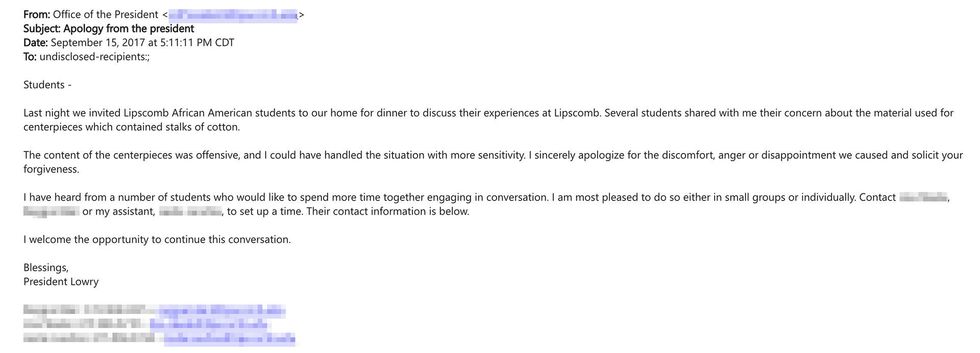
Image source: TheBlaze

The president of a private Christian university in Nashville, Tennessee, apologized for offending a group of black students with cotton-themed centerpieces during a dinner at his home, which was aimed to discuss student experience at the university.
In an email obtained by TheBlaze, provided by a Lipscomb University student who spoke on condition of anonymity, Dr. L. Randolph Lowry III apologized for his cotton-themed dinner centerpieces after receiving various reports of offense from students. The letter read:
Students -Last night we invited Lipscomb African American students to our home for dinner to discuss their experiences at Lipscomb. Several students shared with me their concern about the material used for centerpieces which contained stalks of cotton.
The content of the centerpieces was offensive, and I could have handled the situation with more sensitivity. I sincerely apologize for the discomfort, anger or disappointment we caused and solicit your forgiveness.
I have heard from a number of students who would like to spend more time together engaging in conversation. I am most pleased to do so either in small groups or individually. Contact [name redacted], [name redacted], or my assistant, [name redacted], to set up a time. Their contact information is below.
I welcome the opportunity to continue this conversation.
Blessings,
President Lowry

According to the unnamed source, the dinner was hosted by Lowry at his home for African-American students.
"Dr. Lowry included cotton plants as part of the table centerpiece decorations," the source told TheBlaze and said that the cotton plants "gave liberal students reason enough to be offended."
The source added, "What I am certain of are three things: None of these students have ever been slaves, Dr. Lowry has never owned a slave, and ... people apologize too often when the 'offense' is a construct and not a real occurrence."
Several students on social media voiced their displeasure at Lowry's choice in centerpieces, and took matters into their own hands to express their offense.
In one Instagram post, a young woman who attended the dinner at Lowry's home wrote, "As we arrived to the president's home and proceeded to go in we seen [sic] cotton as the center pieces."
She added, "We also stood and ate dinner, there were no seats to sit in and it felt very uncomfortable. We were very offended, and also the meals that were provided resembled many 'black meals' they had mac n cheese, collard greens, corn bread etc."
The student added that her friend asked Lowry about the centerpieces and said that Lowry told the students that he thought the decor was "fallish," reportedly adding that "it isn't inherently bad if we're all wearing it."
Far too often we are finding ourselves at odds with one another, and many issues are stemming from the very collegiate institutions that should spurn thought-provoking discussions for the betterment of society — and not create "safe spaces" for young adults in the process of cultivating a more all-encompassing perspective.
If institutions of higher learning are not properly equipping young adults to interact with society as adults, what are they doing?
A portion of Lipscomb University's mission statement includes the following verbiage:
We believe that as knowledge grows in use, it also grows in value.With the lessons of our classrooms, we work in the world.
With the certainty of our faith, we serve the good of all.
With the experiences of our past, we plan for the future.
We believe that when you know your gifts, your God, and your direction, you confidently welcome what comes next.
According to the school's Statement of Faith, Churches of Christ — followed by the university's founders — were developed from the American Restoration movement, "which sought to restore unity among believers by rejecting creeds and returning to the Bible, excluding all human opinions and philosophy, as the only rule of faith and practice."
If knowledge grows in both use and value at American universities, why aren't people leading by example?
If the lessons in the classroom are applicable to real-world issues, why do the issues addressed have an inward scope, and don't extend outward?
If experiences of the past are the foundation for plans for the future, why are safe spaces being cultivated to shield people from and perpetuate the resentment of ugly history?